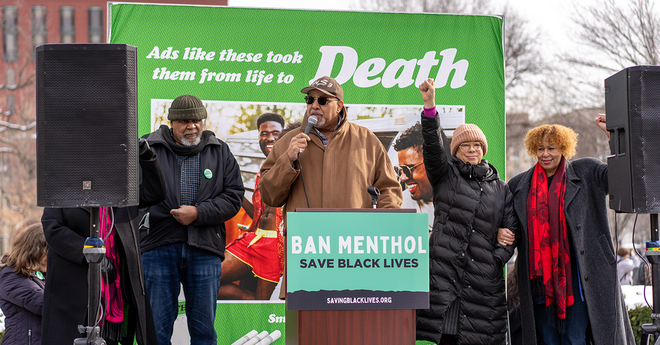How would smokers respond to cigarettes with less nicotine?
Sixty-two percent of adult smokers said they would quit if the Food and Drug Administration limited the level of nicotine in cigarettes, according to a new Truth Initiative® study.
Although smoking rates in the United States have decreased significantly in the past decade, 23 million adult smokers want to quit smoking but haven’t succeeded. The FDA has proposed capping the level of nicotine — the addictive component of cigarettes — to make cigarettes less addictive and help current smokers quit.
The study, published in Drug and Alcohol Dependence, surveyed adult smokers to determine how likely they would be to engage in certain behaviors if cigarettes with reduced nicotine levels were the only kind sold. While 62% said they would quit tobacco — the policy’s intended effect — 78% reported that they would continue smoking low-nicotine cigarettes, 47% said that they would use e-cigarettes, 35% indicated they would illegally buy high-nicotine cigarettes and 30% said they would turn to little cigars and cigarillos. Participants could indicate that they would likely engage in more than one behavior.
The FDA has indicated it is considering proposing such a rule — asking for public comments on the topic in 2018 – but no rule has yet been proposed. The research sheds light on how smokers may behave if this limit goes into effect, especially in a market where smokers can access many alternatives to cigarettes like e-cigarettes, cigars and cigarillos.
Reactions to low-nicotine cigarettes
Are low nicotine cigarettes better for you?
Researchers surveyed 917 adult smokers between the ages of 18 and 54. It’s not clear what smokers know about low-nicotine cigarettes, like the fact that low-nicotine cigarettes are still harmful even though they may not be as addictive, and whether misperceptions about nicotine affect people’s reported intentions.
Certain demographics affect how people were likely to respond to cigarettes with lower nicotine levels and this study was one of the first to look at how smokers intend to react to low-nicotine cigarettes in relation to factors like gender, education, ethnicity and income level. For example, women and people with higher income are more likely to continue using low-nicotine cigarettes, and black, non-Hispanic smokers were more likely to use e-cigarettes. Those with a college education were more likely to intend to quit. Going forward, the researchers note that it will be important to consider these factors when rolling out a low-nicotine policy to make sure that it is effective across all groups.
Level of nicotine dependence, which researchers measured by asking participants how long they typically waited to smoke their first cigarette after waking, also impacted responses. Those with greater dependence — less than 30 minutes to their first cigarette — had higher odds of planning to smoke low-nicotine cigarettes, use e-cigarettes and illegally buy high-nicotine cigarettes.
Smokers who also used other tobacco products like cigars said they were more likely to switch to their other product if faced with low-nicotine cigarettes. This means that new laws with maximum nicotine levels need to apply across all combustible tobacco products to be effective.
Nicotine reductions needed for all combustible tobacco products
Can low nicotine cigarettes help you quit smoking?
The FDA published research in the New England Journal of Medicine indicating that if the policy was implemented by 2020, approximately 5 million additional adult smokers could quit smoking within one year of reducing nicotine levels. Truth Initiative supports the concept of reducing nicotine in cigarettes to non-addictive levels and urges the agency to reduce nicotine on all combustible tobacco products.
Results presented in this new Truth study allow researchers and policy makers to understand potential behavioral impacts of policy implementation. The study’s authors found that a reduced nicotine cigarette policy could positively impact population-level health, but most current cigarette smokers intend to continue using tobacco products, underscoring the need for reduced nicotine levels across combustible products. The authors state that “these findings suggest a reduced-nicotine standard should be implemented across all combustible tobacco products to fully realize the optimal impact of a low-nicotine product policy.”
Truth Initiative offers proven-effective tools to help people quit smoking. BecomeAnEX® is a free, digital quit-smoking plan developed by Truth Initiative in collaboration with Mayo Clinic that has helped more than 800,000 people develop the skills and confidence to successfully quit. Research has shown that following the EX Plan quadruples a tobacco user's chance of quitting. The EX® Program expands on BecomeAnEX to provide an enterprise-level tobacco cessation program designed for employers and health plans.
More in traditional tobacco products
Want support quitting? Join EX Program
By clicking JOIN, you agree to the Terms, Text Message Terms and Privacy Policy.
Msg&Data rates may apply; msgs are automated.



